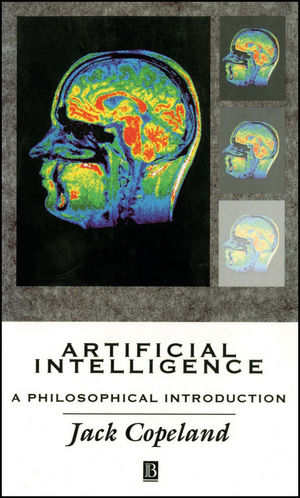Artificial Intelligence: A Philosophical IntroductionISBN: 978-0-631-18385-3
Paperback
336 pages
December 1993, Wiley-Blackwell
 This is a Print-on-Demand title. It will be printed specifically to fill your order. Please allow an additional 10-15 days delivery time. The book is not returnable.
|
||||||
List of figures x
Acknowledgements Xl
Introduction 1
In outline 2
1 The beginnings of Artificial Intelligence: a historical sketch 4
1.1 The arrival of the computer 4
1.2 The Logic Theorist 7
1.3 The Dartmouth Conference 8
1.4 Alan Turing and the philosophy of AI 9
2 Some dazzling exhibits 11
2.1 Inside the machine 11
2.2 Parry the paranoid program 12
2.3 Eliza the psychotherapist 13
2.4 Shrdlu the robot 15
2.5 Hacker the program-writing program 18
2.6 Programs that play games 21
2.7 The General Problem Solver 24-
2.8 Sam and the Frump 26
2.9 Expert systems 30
3 Can a machine think? 33
3.1 Is consciousness necessary for thought? 33
3.2 The Turing Test 37
3.3 Has the Test been passed already? 39
3.4 Four objections to the Turing Test 44-
3.5 Assessing the Test 50
3.6 Decision time S2
4 The symbol system hypothesis 58
4.1 Symbol manipulation 59
4.2 Binary symbols 60
4.3 Programs as symbols 66
4.4 A full-scale program 71
4.5 The definition of a computer 78
4.6 The hypothesis 79
4.7 Multiple realizability 81
5 A hard look at the facts 83
5.1 The evidence for the hypothesis 83
5.2 Getting the evidence into perspective 85
5.3 Hype 95
5.4 Programming common sense 98
5.5 Data versus know-how 100
5.6 The project 102
5.7 The complexity barrier 120
6 The curious case of the Chinese room 121
6.1 The Chinese room argument 123
6.2 What's wrong with the argument? 125
6.3 Deciding about understanding 130
6.4 Turing machines and the biological objection to AI 132
7 Freedom 140
7.1 Turbo Sam makes a choice 141
7.2 Is freedom of the will an illusion? 141
7.3 Two kinds of freedom 145
7.4 Kleptomania and other compulsions 149
7.5 Libertarianism 151
7.6 Predictivism and chaos 154
7.7 The inevitable 157
8 Consciousness 163
8.1 Neglect and disa"ay 163
8.2 The fuzzy baseline 164
8.3 Consciousness as a type of internal monitoring 166
8.4 The ineffable 'feel' of it all 170
8.5 Into the heart of the mystery 172
8.6 What is it like to be a bat? 174
8.7 What Mary doesn't know 176
8.8 Drawing the threads together 179
9 Are we computers? 180
9.1 The strong symbol system hypothesis 180
9.2 Hardware versus wetware 182
9.3 Goodbye, von Neumann 192
9.4 Putting meaning into meat 195
9.5 Believing what you don't believe 198
9.6 Productivity and systematicity 199
9.7 Evaluating the arguments 200
9.8 The meaning of 'computer' 204
10 AI's fresh start: parallel distributed processing 207
10.1 The basic ideas 208
10.2 English lessons 214
10.3 Escape from a nightmare? 216
10.4 The contrast with computers 219
10.5 Comparisons with wetware 221
10.6 Searle's Chinese gym 225
10.7 The Church-Turing thesis 230
10.8 Are our cognitive processes algorithmically calculable? 233
10.9 Simulating networks by computer 241
10.10 The battle for the brain 245
10.11 Concluding remarks 247
Epilogue 249
Notes 250
Bibliography 283
Index 299



